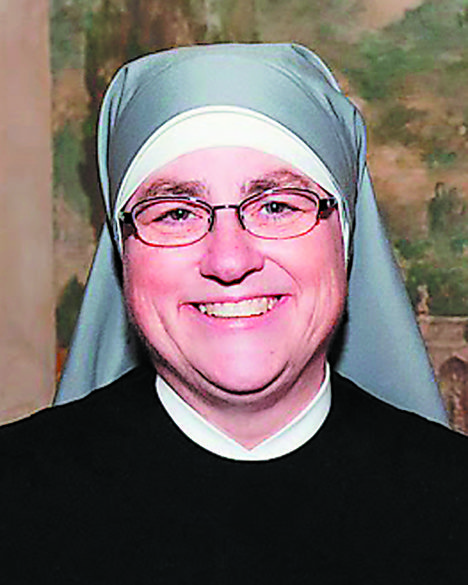GUEST COLUMN
By Sister Constance Veit, LSP
Our motherhouse is located on a large property in a tiny village in rural France. With its old stone buildings, expansive pastures, flower gardens and shaded pathways, it’s a gorgeously bucolic setting and the most peaceful place I’ve ever been.
During the year that I lived there I don’t think I heard a single airplane overhead, an emergency siren or even a car horn. The nighttime silence and dark, starlit skies were especially striking.
Looking up at the stars I felt the deep security of knowing I was enveloped by God’s love.
The memory of those starry Breton skies still quiets my soul and fills me with a sense of peacefulness in the midst of life’s inevitable difficulties.

What a contrast this is to the darkness enveloping our Ukrainian brothers and sisters this winter as their country continues to be bombarded on a daily basis. This darkness is not a blanket of security or prayerful serenity – although cries to God no doubt rise from it – but an inescapable cloud of fear and dread.
As I think of the people of Ukraine during this Advent season, I am reminded of the words of the prophet Isaiah about the people dwelling in darkness. (Is 9:2ff) This passage speaks of a burdensome yoke, a taskmaster’s rod, boots tramped in battle and cloaks rolled in blood.
This is harsh military imagery.
The people living in darkness are wounded and oppressed, like our Ukrainian brothers and sisters today. They desperately need someone to shine a light into the cold cellars and improvised bunkers in which they huddle.
They need a savior.
It is just after the winter solstice, the darkest point of the year, that we celebrate the coming of our Savior at Christmas. Isaiah proclaims, “The people who walked in darkness have seen a great light. Upon those who lived in a land of gloom a light has shone …For a child is born to us, a son is given to us; upon his shoulder dominion rests. They name him Wonder-Counselor, God-Hero, Father-Forever, Prince of Peace.”
In their icons Ukrainian Catholics and Orthodox Christians traditionally portray the Nativity scene as a black cave surrounded by jagged rocks. This inhospitable setting represents the cruel and sinful world into which Jesus was born.
From heaven a large star sends a single shaft of light to pierce the darkness and guide the viewer’s eye directly onto the baby lying in the manger. This babe is the light that will dispel all darkness.
An Orthodox monk reflecting on the Nativity icon wrote, “O God, upon whom will the light shine if not those who live in darkness? If I truly feel that I am in darkness, then I surely will seek the light.”
This insight helps us to understand that the miracle of Christmas is not automatic. We must realize our need to be plucked out of the darkness that surrounds us – we must intentionally seek the light.
For most of our contemporary world, Christmas is filled with bright lights, shiny baubles and excesses of every kind. It is difficult to quiet our hearts enough to seek the true light we so desperately need.
Perhaps an act of solidarity with our Ukrainian brothers and sisters can help us to clarify our priorities this Christmas.
Archbishop Borys Gudziak, Metropolitan of the Ukrainian Catholic Archeparchy of Philadelphia and the highest ranking Ukrainian clergyman in the United States, recently spoke at a meeting of U.S. bishops.
He suggested that we open wide a window in our home, turn the lights out and sit there long enough to really feel the cold. This act of solidarity, he suggested, will help us to feel what the Ukrainian people are experiencing everyday as this war drags on.
May this simple gesture of empathy and solidarity inspire us to intensify our prayers for peace, that the light of Christ will truly pierce the darkness this Christmas – the darkness of sin and war enveloping our world, and the darkness that lurks in each human heart.
O Lord, God-Hero and Prince of Peace, how we need you! Come into our world anew this Christmas and dispel the darkness with your divine light!
(Sister Constance Veit is the communications director for the Little Sisters of the Poor in the United States and an occupational therapist.)

